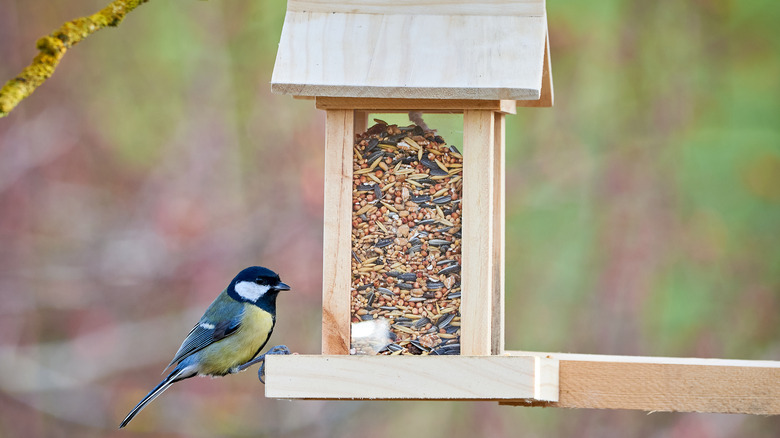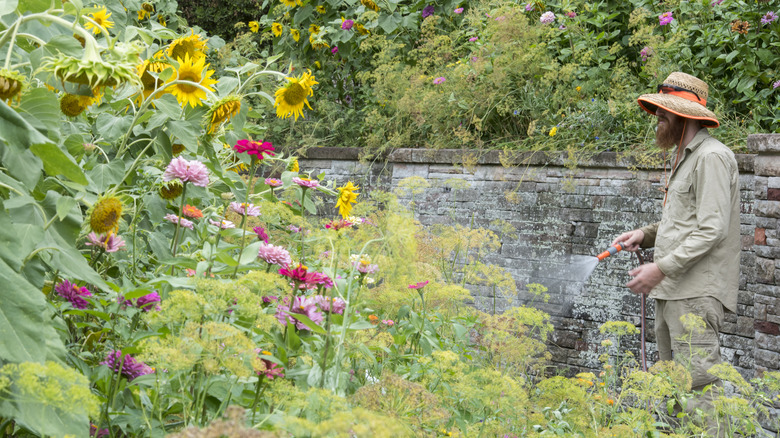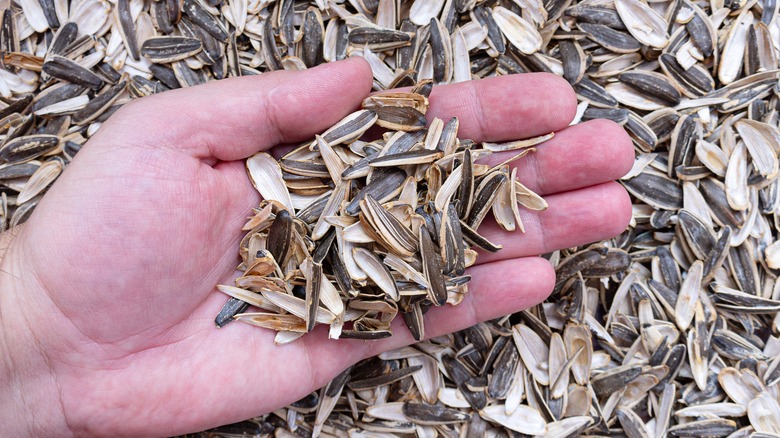If The Plants Under Your Bird Feeder Are Suffering, This Is Probably Why
Bird watching and gardening — two hobbies that should go hand-in-hand, but they seem to have some compatibility issues. You may have been disappointed if you've ever tried to make a picturesque space with a bird feeder hanging from a tree with gorgeous flowers below. What's with that patchy grass, and why aren't plants growing well? The bird feeder seems like it's the source of the problem, but it's not the birds or what comes from them; it's the seeds they eat.
Many birdseed mixes contain sunflower seeds, and sunflower seed hulls are allelopathic, meaning they contain chemicals that harm other plants. Allelopathy is when plants inhibit others from growing because of their chemical makeup, usually due to phytotoxins. They can cause plants to turn yellow and die, have stunted growth, or prevent germination altogether. Since sunflower seed hulls are allelopathic, they can cause trouble in the garden.
Sunflowers are surprisingly toxic to plants
Sunflower seed hulls are certainly allelopathic, but the entire flower appears to be, too. A 1983 study in the Weed Science journal says that extracts from sunflower leaves inhibited the growth of weeds at various rates depending on how diluted it was, meaning that sunflowers can inhibit their neighbors in the garden. Check your bird seed mix and see if it contains sunflower seeds, and then check to see if those seeds have hulls. Now that you know how toxic sunflowers can be, it explains quite a bit.
Sunflower hulls aren't toxic to every plant, however. They seem to do the most damage to plants like potatoes and peppers, Brassicas (or cruciferous vegetables), and grasses, which would explain why the lawn can become so patchy under a feeder. Researchers have tested to see if sunflowers can be used as an environmentally friendly weed control method that could reduce the use of chemical herbicides, and studies showed their inclusion reduced weeds in both current and future crops planted in the same place.
What to do about those pesky hulls
The first step you should take if sunflower hulls harm your garden is choosing a different bird seed. Look for seeds that don't have hulls, or find a mix that omits sunflower seeds. You can also move the bird feeder to a location where you don't have a lush lawn or gorgeous flowers and where you won't mind a dirt patch. Since sunflowers aren't allelopathic against themselves, try planting sunflowers under your bird feeders. Many small sunflower varieties should fit nicely under a feeder, but make sure they don't get too much shade.
If you don't want to change the space, try composting the hulls. The high temperatures of a healthy compost pile will leach out the toxins stored in the hulls. They should sit in the compost bin for at least a month before you add the compost to the garden to ensure the toxins are cleared out. You can also use the seeds as a mulch that will kill weeds, but be sure to do your research and make sure they won't stunt or kill the plants you're mulching. If you have livestock, add them to their feed to give them some extra fiber and carbs.


